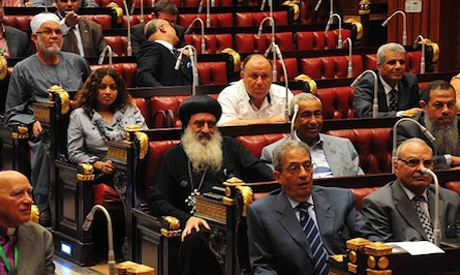Debate over the new constitution’s chapter on freedoms and rights has deepened the rift between Islamists and secularshttp://bit.ly/Rx6TRB
12:23 PM - 1 Sep 12 · Details

Constituent assembly session (Photo: Ahram)
Related
The Constituent Assembly, tasked with writing Egypt’s new constitution, made a lot of progress this week.
The constitution’s chapter on freedoms and rights was completed, and much as 60 per cent of the chapter on the system of government (which regulates the executive, legislative and judicial branches) was also drafted, with the remainder to be concluded next week.
The first reading of the 51-article chapter on freedoms and rights on 27 August, however, caused a clash between Islamist and secular members of the assembly.
Wahid Abdel-Meguid, a liberal-oriented political analyst and the assembly’s official spokesperson, said there would be a great leap forward for press freedoms in the new constitution.
Abdel-Meguid said the chapter of freedoms and rights in the new constitution (chapter 2) was drafted to ensure journalists accused of publication offences would not face jail time.
“This is giant step, not to mention that the draft stipulates that lawsuits against journalists cannot be filed by persons who were not directly affected by the published materials,” said Abdel-Meguid.
The text of Article 12 on freedoms and rights pertaining to journalists, Abdel-Meguid indicated, was drafted to read: “Lawsuits against journalists can be filed only by persons who were directly affected by publication offences and if journalists were convicted, they would not be sent to jail.” Abdel-Meguid said that instead of jail sentences, journalists would be fined handsome sums of money.
Abdel-Meguid also indicated that ordinary citizens will be granted the right to issue newspapers for the first time. “This means that this right will no longer be confined to joint stock companies, public institutions, and political parties,” said Abdel-Meguid.
Abdel-Meguid also boasted that “Article 10 of the same chapter will be drafted to prevent the closing down of newspapers by judicial or administrative order.”
In his words, such orders constitute “collective punishment" and are "no longer viable in an age of freedoms.” He concluded that the new constitution will encourage that all national press and media organisations be made independent of the state.
Islamists, however, begged to differ. Essam El-Erian, a leading official of Muslim Brotherhood’s Freedom and Justice Party (FJP), said: “We are all for press freedoms but we are against the freedom of journalists to slander and insult citizens and public officials.”
El-Erian insisted that “journalists convicted of publication offences (for example, spreading lies) would not be sent to jail, but those found guilty of insulting and direct libel would be subject to the penal codes which imposes jail sentences.”
Joining forces, Younis Makhyoun, a leading member of the ultraconservative Salafist El-Nour Party, argued that “it is essential that journalists accused of libel and slander crimes face jail sentences, while in other offences —such as the crime of disseminating lies — it is enough for journalists and newspapers to face tremendous fines.”
The clash over press freedoms comes against the backdrop of a hostile campaign led by leading figures of the Muslim Brotherhood — the group from which President Mohamed Morsi hails — against what they deem direct insults and libel.
According to chairman of Shura Council and leading FJP official Ahmed Fahmi, “We are in favour of press freedoms but we are againt press hooligans who are fond of insulting public officials without facing harsh punishment."
The above statements and others did not go down well with most members of the board of the Press Syndicate who accuse the Muslim Brotherhood and President Morsi of doing their best to manipulate public and private media.
“They believe that most of the media is controlled by seculars who stand against realising their dream of turning Egypt into a religious state,” Gamal Fahmi, a leftist board member of the Press Syndicate, told Ahram Online.






